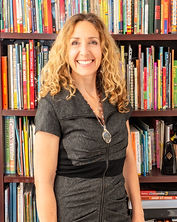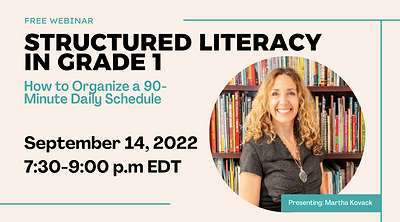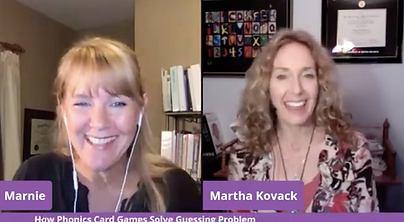
About
This website was created for administrators, preservice teachers, general classroom/special education teachers, families, and students who want to know if there is more we can do to help all beginning readers gain access to the printed word, and find joy along the way.
As a brand new teacher from Ontario, Canada, Martha Kovack, MEd, was curious about the lack of sound-letter knowledge she noticed with 5 out of 20 of her grade two students. It appeared to her that the methods she was taught in teacher's college were not working for this group of children. And they did not seem to be very efficient for the rest.
However, reading a lot of good quality literature and offering meaningful reading and writing experiences seemed not only reasonable, but also critical, and this was what she was taught in teacher's college. So she was confused.
When she asked about the lack of skills that these children had at the beginning of grade two, here are the typical reasons given for their lack of progress:
-
They just haven't caught on yet - but they will.
-
Their parents do not read aloud to them at home.
-
They are stubborn and/or just not interested (the response that I often receive from teachers (friends, and otherwise) about my experiences with structured literacy success never cease to amaze me - "Oh, they finally picked up their socks, eh?" or "Oh, they finally decided to put in the effort) (!?!)
-
Their parents do not spend time with them.
-
Their parents do not speak English.
-
They have ADHD.
-
They have poor visual memories.
-
They would just rather play.
-
They aren't developmentally ready.
-
They have poor visual tracking - words jump around on the page for them.
-
They have a troublesome home life.
-
They are just weak readers.
-
They need special education because of all of these reasons.
So, while some of these things seemed to make sense, many did not, and she spent the rest of her career trying to find answers that would alleviate the inequity and the suffering for those who struggle with reading and writing. At the same time, her own son was struggling with speaking and listening - the foundation for reading and writing - and this, too, became a focus of her attention.
Fortunately, a few years later, Martha was blessed to teach under the guidance of a very dedicated and supportive principal, Ada Kallio, who introduced her to a language arts program called Open Court. This program taught Martha how to teach phonics in a more systematic and explicit way, and the results were exciting and motivating to witness. This sparked a lifelong curiosity as she learned that research actually had a lot of the answers about beginning reading instruction. But (back in the 90s) she had to drive to the Ontario Institute for Studies in Education (OISE) at the University of Toronto to find this research for herself. For over thirty years, this research has tried to make its way into the practices of caring and dedicated teachers, but to no avail. It is only recently (since about 2020) that we seem to have hit a critical mass of educators who are asking how we can do better.
This website is intended to be a living breathing website for teachers, administrators, families, and students to guide them on their journey to "know better", so they can "do better". Martha updates the website regularly, adding, changing, and/or deleting her favourite resources as she learns more.
Let's get reading right!
Martha Kovack, MEd, OCT
Founder & CEO of Sound Readers®







